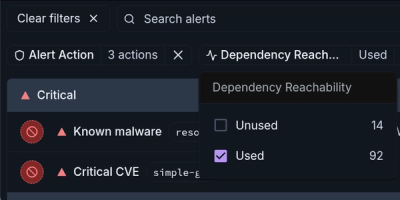
Security News
CISA Rebuffs Funding Concerns as CVE Foundation Draws Criticism
CISA denies CVE funding issues amid backlash over a new CVE foundation formed by board members, raising concerns about transparency and program governance.
flow control library with a chaining interface, inspired by node-seq by substack

Simple flow control library inspired by seq by substack and async by caolan.
The interface is quite similar but with a reduced function range.
Instead of using the this property to assign a done-callback the traditional node way is used (a callback function as the last parameter).
npm install chainr
Functions registered via .seq are executed in sequential order.
Each cb gets a callback assigned which is used to signal the end of the callback execution.
If name is specified, the second argument sent to cb goes to chain.var.
var chainr = require('../');
var chain = chainr();
chain
.seq('foo', function (cb) {
console.log('1');
setTimeout(cb.bind(null, null, 'bar'), 100);
})
.seq(function (cb) {
console.log('2');
setTimeout(cb, 100);
})
.seq(function (cb) {
console.log('3');
console.log(chain.vars);
});
Output:
1
2
3
{ foo: 'bar' }
Functions registered via .par are executed in parallel.
Each cb gets a callback assigned which is used to signal the end of the callback execution.
If name is specified, the second argument sent to cb goes to chain.var.
var chainr = require('../');
var chain = chainr();
chain
.par(function(cb) {
setTimeout(function() {
console.log('1.1');
cb();
}, 1000);
})
.par('foo', function(cb) {
setTimeout(function() {
console.log('1.2');
cb(null, 'bar');
}, 400);
})
.par(function(cb) {
setTimeout(function() {
console.log('1.3');
cb();
}, 100);
})
.seq(function (cb) {
console.log(chain.vars);
});
Output:
1.3
1.2
1.1
{ foo: 'bar' }
Functions registered via .one are executed in parallel.
one acts equally as par with the distinction that it does not wait for all callbacks to execute, one call is sufficient.
Each cb gets a callback assigned which is used to signal the end of the callback execution.
If name is specified, the second argument sent to cb goes to chain.var. (Notice that not every value might be in there!)
var chainr = require('../');
var order = [];
var chain = chainr();
chain
.one(function(cb) {
setTimeout(function() {
console.log('1.1');
order.push('1.1');
cb();
}, 1000);
})
.one(function(cb) {
setTimeout(function() {
console.log('1.2');
order.push('1.2');
cb();
}, 400);
})
.one(function(cb) {
setTimeout(function() {
console.log('1.3');
order.push('1.3');
cb();
}, 100);
})
.seq(function (cb) {
console.log(order);
});
Output:
1.3
1.2
1.1
['1.1']
When in a sequential or parallel context a callback gets an error object assigned, the execution steps over all pending steps and skips to the next catch block.
The catch block than receives the error and an callback that can be used to continue with the execution or to rethrow the error.
var chainr = require('../');
chainr()
.seq(function (cb) {
cb(new Error('foo'));
})
.seq(function (cb) {
console.log('2');
cb();
})
.catch(function (error, cb) {
console.log(error);
cb(error);
})
.catch(function(error, cb) {
console.log(error);
cb();
})
.seq(function() {
console.log('final');
});
Output:
[Error: foo]
[Error: foo]
final
FAQs
flow control library with a chaining interface, inspired by node-seq by substack
We found that chainr demonstrated a not healthy version release cadence and project activity because the last version was released a year ago. It has 1 open source maintainer collaborating on the project.
Did you know?

Socket for GitHub automatically highlights issues in each pull request and monitors the health of all your open source dependencies. Discover the contents of your packages and block harmful activity before you install or update your dependencies.

Security News
CISA denies CVE funding issues amid backlash over a new CVE foundation formed by board members, raising concerns about transparency and program governance.

Product
We’re excited to announce a powerful new capability in Socket: historical data and enhanced analytics.

Product
Module Reachability filters out unreachable CVEs so you can focus on vulnerabilities that actually matter to your application.